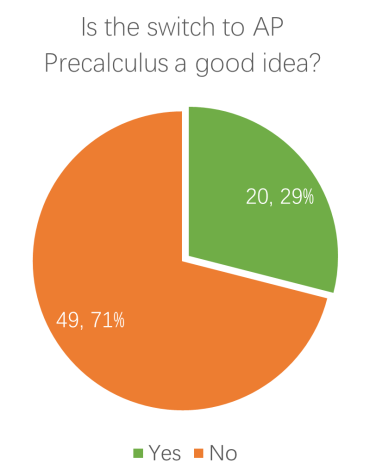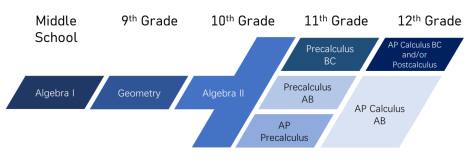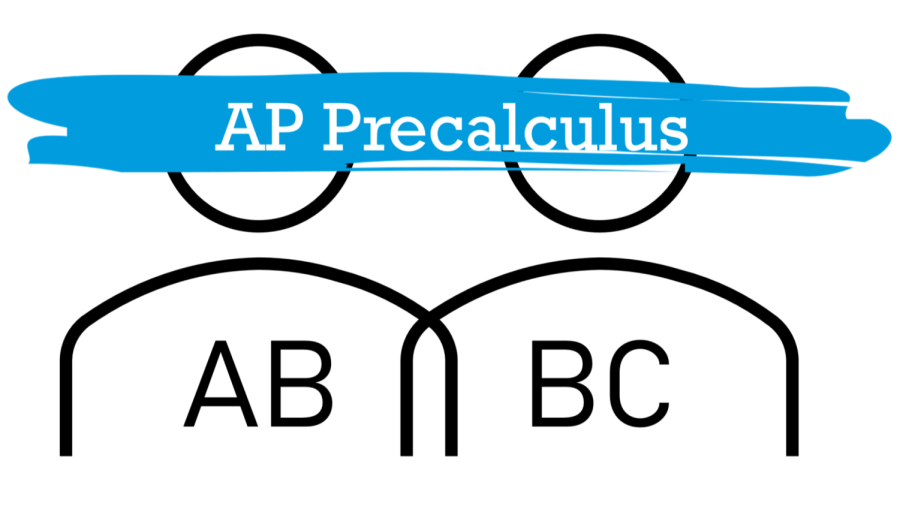AP Precalculus comes to CVHS: new curriculum, unexpected changes
College Board’s AP Precalculus is set to debut next year, replacing Precalculus AB and BC.
Editor’s note: This story was updated April 19 to reflect new information regarding the policy.
Wednesday, Feb. 22, advocacy. Students in course selection meetings heard the definitive answer after months of speculation: Precalculus AB and BC were no more and were to be replaced by AP Precalculus for the 2023-2024 school year.
The implementation of AP Precalculus in favor of the existing classes is based on a rumor from the district. There is speculation surrounding whether HISD will change the precalculus policy next year, wherein schools would only be allowed to offer a 4.0 on-level course and a 5.0 AP course for classes precalculus. CVHS preemptively fully adopted AP Precalculus to avoid the risk of placing students in a 4.0 class.
AP Precalculus is an AP class to be introduced nationwide for the upcoming school year, advertised as being a swap-in replacement for preexisting precalculus classes. College Board has said that “every student ready for precalculus is ready for AP Precalculus” but that the AP course was “not a prerequisite for and does not have to be followed by AP Calculus AB or BC.”
The current system at CVHS, however, involves two classes: Precalculus AB and Precalculus BC. Both are listed under the same course ID, with Precalculus BC students being split into designated class periods that only teach the accelerated course material.
Unlike other schools that teach AP Calculus BC with both AB and BC content, CVHS’s curriculum only teaches BC, with all of AP Calculus AB content being a prerequisite. This can be fulfilled by taking AP Calculus AB, passing a placement test at the end of Precalculus AB or by taking Precalculus BC, which includes content from both Precalculus AB and AP Calculus AB.

For some students, replacing Precalculus AB and BC with AP Precalculus means limiting students that wanted to take advanced math.
“I feel that for students who want to really dive into math and, you know, continue with those courses, I think that losing Precal AB and BC, but especially BC, would really be a loss for our students,” Nathaniel Barnett, a senior that took Precalculus BC, said.
Indeed, in a survey administered to 69 CVHS students, 71% (49 students) said that the removal of Precalculus AB and BC in favor of AP Precalculus was a bad change. Of the 23 students that have reported taking Precalculus BC, the average rated importance of the class was 9.35/10.
“I feel like there were already people who wanted [Precalculus BC], and removing that opportunity was perhaps unnecessary,” Rowan Willard, a freshman currently taking Algebra II, said.
The removal of Precalculus BC in favor of AP Precalculus would also limit access to AP Calculus BC to students that had already taken Geometry in middle school or those that can pass a placement test.
“Coming from a middle school that only offered Algebra 1 and taking the standard route of Geometry to Algebra 2, there would have been absolutely no time for me to reach Calc BC or Post Calculus,” a survey respondent said. “Precal BC is a shortcut that is necessary for the school and is one of the only things that distinguishes Carnegie from other schools.”
However, for other students, AP Precalculus meant easier course selections. One student expressed support for the AP course in the survey, saying that it “makes choosing no longer a hassle.” Still, others preferred having the choice between different courses.
“I don’t think that those people should be forced to take a curriculum that they could take faster,” Willard said.

Students aren’t the only group College Board has been marketing AP Precalculus to, however.
“The benefits, I think, are mainly administrative,” Barnett said. “HISD has the benefit of having a streamlined, one-size-fits-all curriculum, and whether or not that works for Carnegie will remain to be seen.”
For College Board, AP Precalculus was meant to make precalculus classes more accessible, with the “trusted AP standard” ensuring uniformity in content matter.
“When I originally found out that College Board was adding AP Precalculus, I thought it would be kind of in the middle of AB and BC,” Paxton Yoder, a sophomore taking Algebra II, said. “I thought BC would be the harder option [and] AB would be like the easier option, because APs are supposed to be a little more difficult.”
College Board has promised that AP Precalculus has the benefits that other AP classes get for being branded as such: the AP Classroom platform, access to AP Daily videos, college credit and more instructor time as compared to a college course.
“Really, the only appeal is that it’s the easiest precal out of, I guess, all of the options that could be available [at CVHS], and it’s an AP credit,” Yoder said.
The Course and Exam Description for AP Precalculus states that the course’s fourth unit, which covers parametrics, vectors and matrices, is optional and won’t be tested on the AP exam. Any Precalculus BC content taken from AP Calculus AB, such as derivatives, also won’t be covered.
“I do find it difficult to reconcile that curriculum with College Board saying that AP Precal is meant to prepare students for calculus, because in my reading, it doesn’t,” Barnett said. “I find that, sort of the way that they’ve set the topics won’t be adequate preparation for all the stuff I’ve seen come up in [calculus].”
Barnett, Willard and Yoder all weren’t against the idea of AP Precalculus by itself.
“I don’t necessarily believe that AP Precal is a bad math course,” Barnett said. “I think, you know, it’ll be just fine for whoever takes it, whoever teaches it, you know, it’ll be fine.”
Yoder suggested concurrently offering AB, BC and AP, while Willard stressed the importance of distinguishing between AB and BC.
“I do believe that in moving from our current structure of precalculus down into this course, we are probably going to be moving into curriculum that may not suit Carnegie’s needs as well as AB and BC do,” Barnett said. “And I do feel in general that I know I wouldn’t be as successful or as motivated or excited about math as I am had I taken AP Precal.”
HISD Curriculum Development did not respond to a request for comment; messages were left by phone and email.
Your donation will support the student journalists of Carnegie Vanguard High School. Your contribution will allow us to cover our annual website hosting costs and fund field trips, competition fees, and equipment. We appreciate your support!

Jerry Fan is a senior at CVHS in his third year of involvement in scholastic journalism. Passionate about public transportation and education alike, he...







